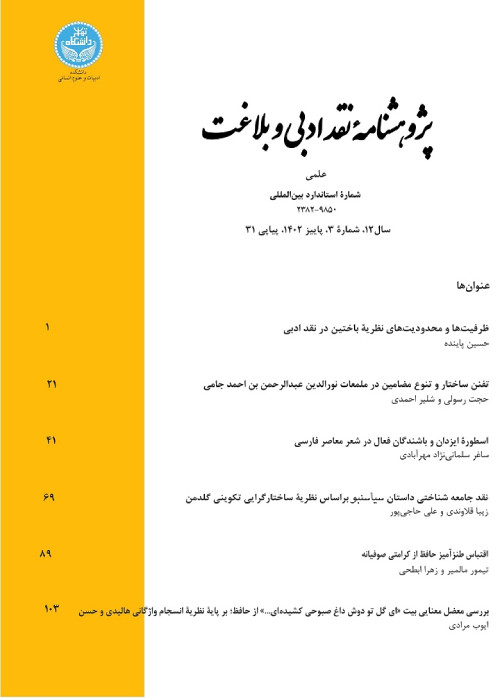The Logic of Interaction in Classical Persian Political-Moral Narratives: Social Etiquette and Distance Selection
Persian political-ethical books are a set of policies that prescribe or implicitly shared aspects of social etiquette directly with the audience and the listener. In other words, these works are a source for a variety of customs and a model for how to regulate distance and social space among people. In this article, aspects of distancing based on the contexts and topics of social etiquette such as speech and listening, nutrition and food, covering and disguise, sitting and standing, friendship and enmity are interpreted in six important Persian moral-political works. The result shows that all areas and topics under investigation are based on creating a distance and observing pre-established order or existing natural rules that are represented in each of the areas with specific indications/signs. In the matter of speech, the words of the upper class, such as kings and sages, regardless of the subject matter, are regarded as advice and wisdom, and listening to it is considered a legitimizing blessing. In terms of eating etiqutte, they bring examples of the elaborate dining tables of the upper class, who want to keep their distance from others as a dramatic consumption. The etiquette of covering and disguise also serves as class distinction and social distancing in a marked way. In the manners of sitting and standing, distancing is based on body management. The upper class acts with a free and relaxed body, while the lower class maintains their distance with the upper class by sitting on two knees, talking slowly, etc. For the etiquette of friendship and enmity, which is a part of social etiquette, keeping a distance from the enemy is necessary in any case, and not observing it is the cause of loss and deterioration. According to the epistemological model of the classical world and the attached socio-aristocratic aristocracy, all the mentioned fields and subjects serve in a marked way to differentiate and create a hierarchical distance. In these works, whether prescriptive propositions or narratives, they invite the audience-listener to class discipline and assume it as a form of tradition or an aspect of rationality. Such a call would automatically tie the discipline to sources of legitimacy.
- حق عضویت دریافتی صرف حمایت از نشریات عضو و نگهداری، تکمیل و توسعه مگیران میشود.
- پرداخت حق اشتراک و دانلود مقالات اجازه بازنشر آن در سایر رسانههای چاپی و دیجیتال را به کاربر نمیدهد.


